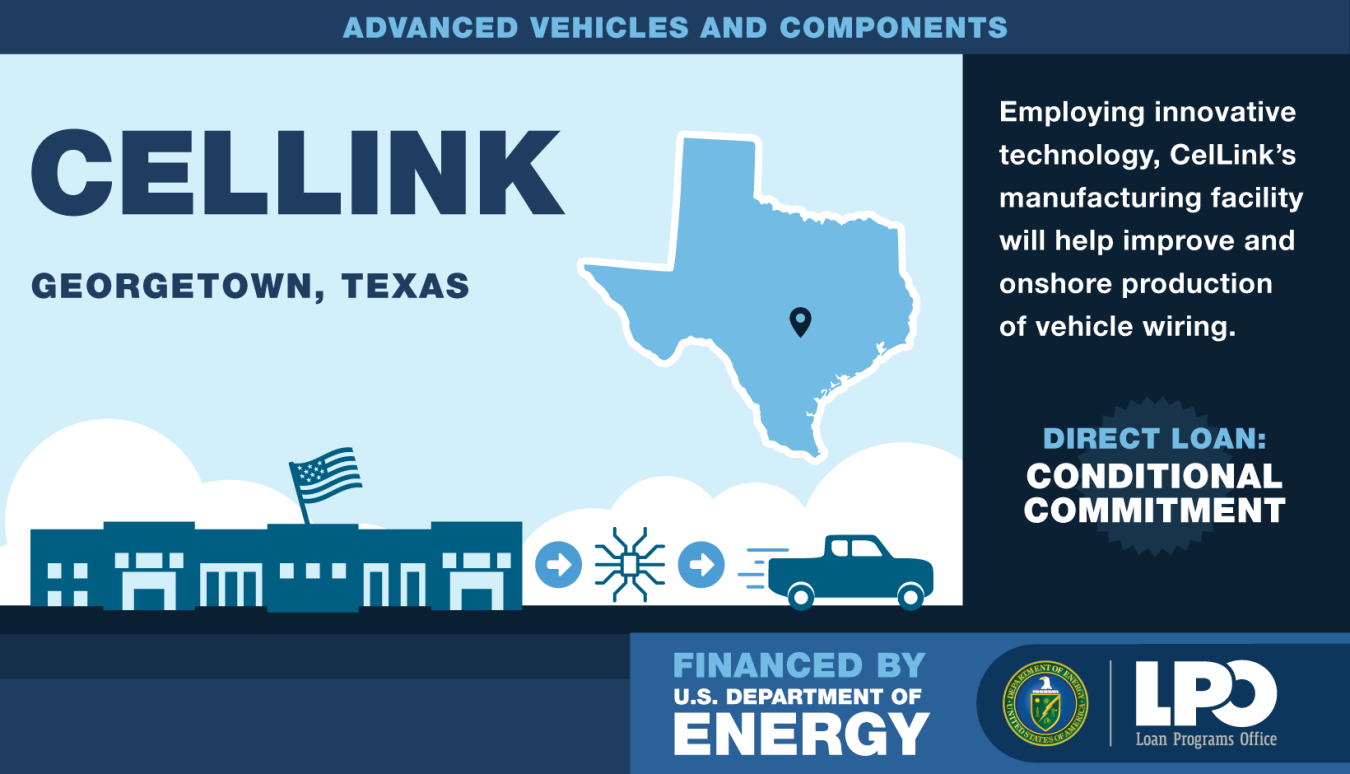
Today, the U.S. Department of Energy’s (DOE) Loan Programs Office (LPO) announced a conditional commitment to CelLink Corporation (CelLink) for a $362 million loan to help finance the construction of a domestic manufacturing facility to develop lighter and more efficient flexible circuit wiring harnesses for automotive and other industries. Wiring harnesses, key components of cars, are sets of wires and related equipment that relay information and carry electricity throughout vehicles. CelLink’s flexible circuit wiring harnesses, called “flex harnesses,” are lighter, smaller, faster to produce, and can be less expensive than conventional wiring harnesses. Once fully operational, the facility located in Georgetown, Texas, is expected to produce flex harnesses to support approximately 2.7 million electric vehicles (EVs) per year and displace an estimated 7.7 million gallons of gasoline annually due to weight and space savings of the flex harnesses. When fully operational, the project is expected to create 165 construction jobs and more than 1,200 permanent jobs.
This effort supports President Biden’s Investing in America agenda to onshore and re-shore domestic manufacturing of technologies that are critical to reaching the clean energy and transportation future. LPO, leveraging additional loan authority provided by the Inflation Reduction Act, is spurring billions in public-private sector investments that will boost the nation’s competitiveness, strengthen supply chains, and create good-paying jobs to power the clean energy economy.
Most wire harness production for the U.S. market currently occurs in countries with low labor costs due to the complex processes associated with traditional wire harness assembly. CelLink’s flex harnesses address this shortcoming and help enable U.S. manufacturing of these components through a new proprietary technology. The flat design of CelLink’s flex harnesses can reduce vehicle weight and provide better heat dissipation for improved propulsion system efficiency, as well as lowering vehicle manufacturing costs.
CelLink, which already has products installed in more than a million vehicles on the road, currently operates a manufacturing facility in San Carlos, California. However, the company is building additional capacity to keep pace with rising demand. Once completed, the new Texas facility will hold up to 25 manufacturing lines that will be commissioned in stages over the next several years based on customer demand.
Georgetown, Texas, and nearby communities are DOE-identified disadvantaged communities (DACs). The project’s support for overburdened and underserved communities and their workers aligns with the Biden-Harris Administration’s Justice40 initiative to ensure at least 40% of the benefits of federal clean energy investments flow to DACs. LPO works with all borrowers to create good-paying jobs with strong labor standards during construction, operations, and throughout the life of the loan and to adhere to a strong Community Benefits Plan.
To recruit for operations jobs, CelLink plans to develop partnerships with nearby Fort Hood, Austin Regional Manufacturing Association, community High Schools, the Texas State Technical College, Austin Community College, and others. CelLink plans to provide competitive wages, health benefits, and company stock to full-time hires.
CelLink’s technology, now in demand in the EV and general automotive markets, has applications across numerous other industries, including aviation, space, consumer electronics, and appliances. Notably, CelLink originally developed the flex harness for use in solar panels. Early support for CelLink’s applied research and development for the manufacturing of its innovative high conductance flexible circuits came from DOE’s Solar Energy Technologies Office nearly a decade ago.
The loan would be offered through the Advanced Technology Vehicles Manufacturing (ATVM) Loan Program, which provides loans to support U.S. manufacturing of advanced technology vehicles, qualifying components, and materials that improve fuel economy. With several recent ATVM projects in the last year, LPO is helping to achieve the Biden-Harris Administration’s goal that half of all new vehicles sold in 2030 are zero-emissions vehicles.
While this conditional commitment demonstrates the Department’s intent to finance the project, several steps remain for the project to reach critical milestones, and certain conditions must be satisfied before the Department issues a final loan.

